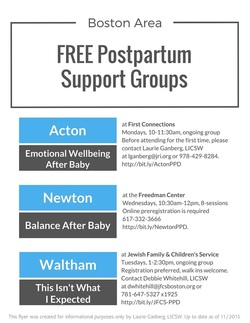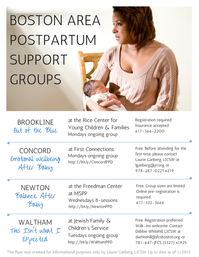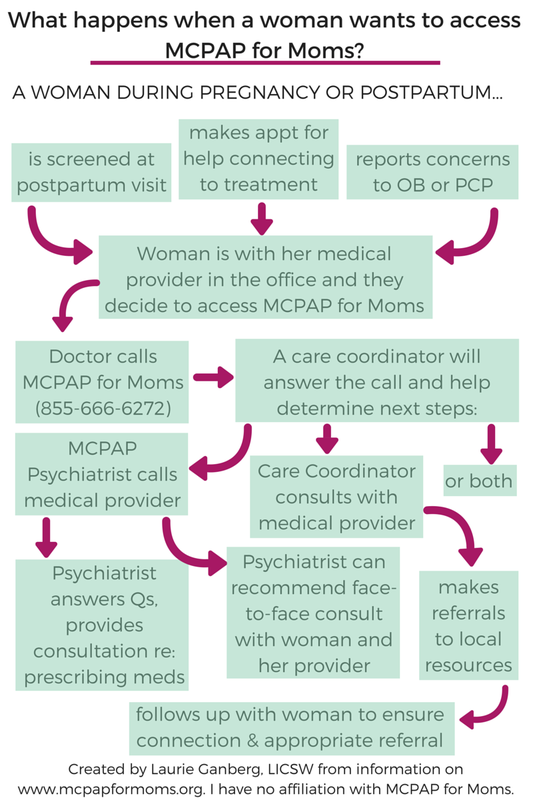 Latest update of the flyer of FREE postpartum support groups that focus on postpartum emotional complications like postpartum depression, mood, and anxiety disorders. This is a great resource for birth, postpartum, and lactation professionals to share with clients while providing education about prevalence, risk factors and signs to look out for. Other postpartum groups can be found at the Postpartum Support International of Massachusetts website. The next session of my postpartum group will start in January 2016. Adjusting to Motherhood is a small, 6-week group for women experiencing adjustment challenges or emotional complications in the postpartum year or after adopting an infant. Learn more about Adjusting to Motherhood...
 Depression and anxiety are incredibly common both during pregnancy and after childbirth, but sometimes it's hard to get past the jargon and austere clinical descriptions of symptoms. Postpartum Progress features clear, accessible writing from real women who've experienced perinatal emotional complications - Warrior Moms - as well as professionals from all over the country. They also have a private forum and are hosting their first conference in Boston this summer! One of my favorite posts featured photos of women to demonstrate what it looks like when someone is suffering from a perinatal emotional complication (hint: not what you think!). "Plain Mama English" posts describing symptoms of postpartum depression, anxiety and psychosis are probably my other most referenced posts. You can even download nice PDFs to print out. Their newest tool is a New Mom Checklist for Maternal Mental Health Help, a checklist that a postpartum woman can bring to her care provider to start a conversation about getting help. This year is their third putting on the Climb Out of the Darkness, an awareness and fundraising event for Postpartum Progress and perinatal emotional complications. On June 20, there will be a Climb at Walden Pond in Concord, MA and others around the country where women who've experienced perinatal emotional complications and the people who support them will get together outside, create community, and symbolize the journey out of postpartum depression and anxiety and into the light of hope and recovery on the longest day of the year. You can find a climb near you or donate to my "couch" climb effort here. Postpartum Progress started exploring the needs of women of color who suffer perinatal emotional complications and surveyed women of color about their experiences at the beginning of 2015. I hope Postpartum Progress continues engaging and amplifying the voices of women of color, as well as exploring and increasing awareness of unmet needs of mothers of color. This post is part of the RESOURCES series where I feature websites, organizations, and information about perinatal emotional complications, parenting, therapy, reproductive health, and more. If you have a suggestion for a resource you'd like to see profiled, please let me know in the comments!
I've been getting lots of great responses in my survey of groups and classes for pregnant women, parents-to-be, and new parents. Please, keep them coming! If you're expecting a child, have a young child, or work with expectant and new families, please share your thoughts in the survey below. Responses are anonymous, but if you have any feedback or groups you want to share with me directly, please feel free to contact me! And if you want to be sure to get the compiled results and hear about next steps to meet the needs in the community, sign up for my newsletter.
03/06/2015 UPDATE: I'm excited to share that Kathleen Biebel, PhD, Program Director for MCPAP for Moms (M4M) was kind enough to add some comments and clarifications to my post. I'm including her words below in red. And, they are working on creating their own infographic, which will aim to capture some more of the subtleties of the flow of what happens when a woman and her medical provider contact MCPAP for Moms. Once it's available, I'll be sure to link to it.  Another unique-to-Massachusetts resource, MCPAP for Moms offers medical providers a Monday-Friday 9-5 phone line to speak to a care coordinator who can connect the provider to a MCPAP for Moms perinatal psychiatrist for consultation and/or help with connecting a mother and family to a community perinatal mental health provider. What does this look like? If a woman is at her OB's office or is talking to her primary care provider (PCP), and she feels comfortable sharing that she is struggling with anxiety or depression or other emotional complications in the postpartum period, her doctor can call MCPAP for Moms. The medical provider will get a call back from a MCPAP for Moms psychiatrist to discuss diagnostic questions or get guidance about a medication prescription. (They can (and do) discuss a whole range of issues that can also include depression screening, community mental health resources – it can really run the gamut). A MCPAP for Moms care coordinator can also provide referrals for therapists and support groups in the woman's community who specialize in postpartum mood and anxiety disorders. Since finding psychiatrists that have openings, who feel comfortable managing medication in pregnancy or while breastfeeding, and who accept insurance can be an enormous challenge, there is the great potential for this to help with more rapid connection to treatment for moms. (Absolutely! Another huge part of what M4M docs do is to help the calling provider start and/or continue to provide mental health care for perinatal women when appropriate. This is a huge goal of M4M – to support OB and PCP and psychiatric providers as they attend to the mental health care of their patients, and to increase their capacity and comfort in doing so). My concern about the program, however, is whether it will be effective in increasing access treatment for women of color, who frequently experience discrimination in the medical system. I wonder whether women of color will be willing to bring their questions about emotional health to medical providers, especially if those providers have not already screened for emotional distress. I look forward to hearing more from MCPAP for Moms about who they're reaching. (We at M4M share your concern that minority and under-resourced women are more likely to experience perinatal mental health concerns, and are less likely to access and engage in treatment. M4M aims to increase access to treatment for all women by increasing the capacity of providers serving perinatal women with mental health concerns. Our M4M docs, when working with calling providers, encourage depression screening, discuss a wide range of treatment options and considerations, review community based resources, etc. Our M4M docs work with providers with the information they share with us about their patients, which may or may not address someone's racial or cultural identity. We at M4M do not provide any direct treatment for women). Medical providers who are looking for more information about MCPAP for Moms can look here. I've talked with many folks who are unsure how the MCPAP for Moms process works, so I created a little infographic to help explain it. The information was gathered at meetings I have been at with MCPAP for Moms and their website and represents my understanding of the program. I'm not affiliated with MCPAP for Moms. This post is part of the RESOURCES series where every week I feature websites, organizations, and information about perinatal emotional complications, parenting, therapy, reproductive health, and more. If you have a suggestion for a resource you'd like to see profiled, please let me know in the comments!  I've written before about why I think support groups are helpful. This resource is an informational flyer about four of the postpartum support groups in the Boston area. There are other groups that are run periodically by individual providers and other groups further afield. I find that with my practice in Cambridge and the work I do in Concord, these are the ones that I'm continually referring to, so I thought I'd make an easy flyer to share. I hope that lactation consultants, doulas, other therapists, OBs, midwives, childbirth educators and any one else that works with pregnant or postpartum women might share it with their clients so that if a new mom needs a group for support in the postpartum period with postpartum depression, anxiety, or general adjustment stress and challenges, they'll know where to turn!
 I've been doing some volunteering for Postpartum Support International of MA so I'm especially eager to share that we have been updating the provider and support group listings available on the PSI of MA website or by calling their warmline at 1-866-472-1897. What's a warmline you ask? You call and leave a message and within 24 hours, a volunteer will get back to you to answer questions about postpartum depression, anxiety, and other adjustment challenges, as well as help connect you to providers and support groups in your area. If you're troubled what you or a family/friend is experiencing in the postpartum period and don't know where to start, the PSI of MA warmline is a great place to turn to talk to a knowledgeable, supportive trained volunteer. This post is part of the RESOURCES series where every Thursday I feature websites, organizations, and information about perinatal emotional complications, parenting, therapy, reproductive health, and more. If you have a suggestion for a resource you'd like to see profiled, please let me know in the comments!  In Boston, we're lucky enough to have the Center for Women's Health at Massachusetts General Hospital. Not only do they conduct and disseminate information about the latest perinatal research, but they offer consultations for pregnant and postpartum women. They recently had a look back of important posts on the blog from 2014, including their excellent response to the NY Times article on SSRI use during pregnancy. This post is part of the RESOURCES series where every Thursday I feature websites, organizations, and information about perinatal emotional complications, parenting, therapy, reproductive health, and more. If you have a suggestion for a resource you'd like to see profiled, please let me know in the comments! |
Therapy, Groups, Supervision, Consultation, Training in Seattle, WA and online in Washington state
Laurie Ganberg, LICSW, PMH-C (#LW60673320) ~ Specializing in Perinatal Mental Health, Trauma, & Fat Liberation
Now practicing through Fiddlehead Therapy, PLLC with online services and in person in Mountlake Terrace, WA
Home | Privacy | Contact | Zoom Link
© 2019-2024 All rights reserved
Laurie Ganberg, LICSW, PMH-C (#LW60673320) ~ Specializing in Perinatal Mental Health, Trauma, & Fat Liberation
Now practicing through Fiddlehead Therapy, PLLC with online services and in person in Mountlake Terrace, WA
Home | Privacy | Contact | Zoom Link
© 2019-2024 All rights reserved


